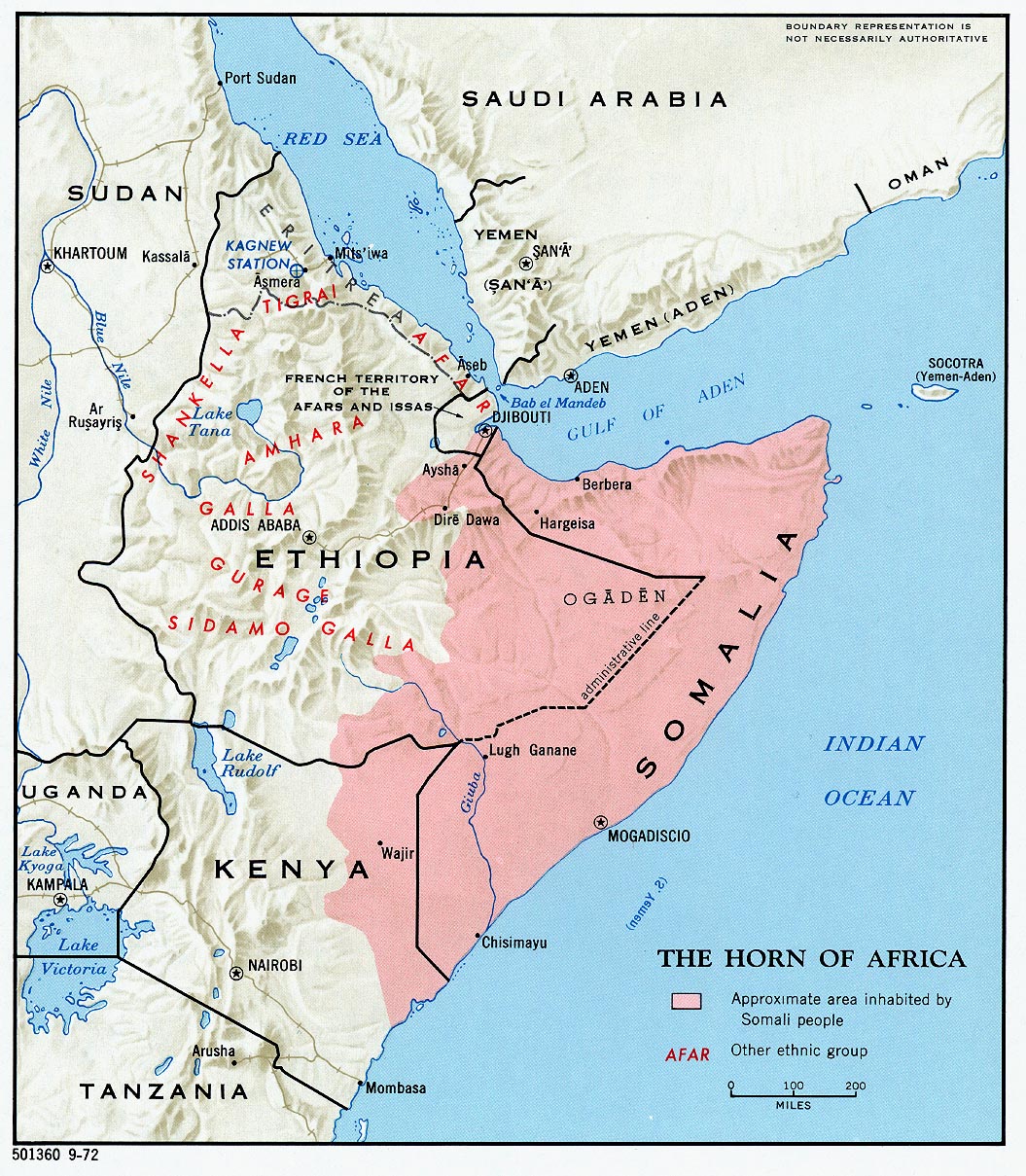A Democratic Ethiopia...?
Yesterday was the anniversary of the 2005 election violence in Ethiopia that, according to judge Wolde-Michael Meshesha, claimed the lives of some 193 people nationwide. The judge, who oversaw the investigation and exposed a government cover-up, has since fled the country.
The violence took place when civilians gathered in the capital, Addis Ababa, to protest the fraud-plagued national elections. Riot police were on hand to disperse the crowds. Some 160 people were shot, strangled and beaten to death in Addis Ababa alone. At least 40 of them were teenagers; think Kent State times ten.
At the center of all this is Ethiopia's veteran prime minister, Meles Zenawi. As the chairman of the Ethiopian People's Revolutionary Democratic Front (EPRDF), Meles was a key figure in toppling the megalomaniac Mengistu Haile Mariam and his Marxist regime, the Derg. During its seventeen year rule (with the compulsory period of 'Red Terror'), the Derg became one of the world's foremost suspenders of haebus corpus--a policy, it should be noted, that the U.S. is currently pursuing.
In power since the coup of 1991, Meles has now ruled almost as long as his Stalinist predecessor. And like Mengistu--who is reported to have strangled Emperor Haile Selassie with his bare hands--Meles is given to violent repression of political dissent.
This propensity has only been accelerated by Ethiopia's sensitive security situation: the country faces ongoing tension with Eritrea over the borderlands in the north (which burst into war during the late 90's), cross border cattle-rustling with Kenya in the south, and its biggest threat--an undeclared war with Muslims in the east, a story as old as Ethiopia itself.
Indeed, the army's clashes with Somalis in the Ethiopia's Ogaden region have spilled over into Somalia, where it is widely believed that Ethiopia is fighting a proxy war with Eritrea, one of the chief supporters of the Union of Islamic Courts. The rapidly expanding UIC is alleged to have connections with Al Qaeda. With the presence of Ethiopian troops in Somalia being the Horn of Africa's worst-kept secret, the consensus in Addis Ababa is that Ethiopia is doing the United States' dirty work.

With Judge Meshesha still receiving death threats, hundreds of opposition leaders in jail, and Meles in his fifteenth year in power, one has to wonder whether the United States' shadowy dealings are ultimately in everyone's best interest. While the Union of Islamic Courts is no more democratic than the regime that went before it (also, it so happens, another cackhanded Marxist boondoggle), it is difficult to conceive what good can come from strengthening any anti-democratic government.
Could it be a decision between the lesser of two evils? Could it be a case of realpolitik on the ground? Or could it be because Ethiopia has been a Christian kingdom since time immemorial, an oasis in a hotbed of Islamic hostility?
Whatever the reasoning, the U.S. would do well to learn from its past dealings with African dictators. The Cold War encouraged a black-or-white foreign policy that kept the kleptocratic Mobutu in power long after his Zaire regime was tenable; the fallout from his reign included millions of lives, and a failed state that just barely has its act together. And anxieties over the ANC's ties to the Soviet Union (that's right kiddies--Nelson Mandela was a no-good commie!) gave Reagan cause to support the white supremacist government in South Africa long after the rest of the world called for majority rule.
If the U.S. is really serious about spreading the seeds of democracy, it needs to find a way to do so democratically. As we have learned from the 20th century experiments in fascism and communism, the end does not necessarily justify the means.
The violence took place when civilians gathered in the capital, Addis Ababa, to protest the fraud-plagued national elections. Riot police were on hand to disperse the crowds. Some 160 people were shot, strangled and beaten to death in Addis Ababa alone. At least 40 of them were teenagers; think Kent State times ten.
At the center of all this is Ethiopia's veteran prime minister, Meles Zenawi. As the chairman of the Ethiopian People's Revolutionary Democratic Front (EPRDF), Meles was a key figure in toppling the megalomaniac Mengistu Haile Mariam and his Marxist regime, the Derg. During its seventeen year rule (with the compulsory period of 'Red Terror'), the Derg became one of the world's foremost suspenders of haebus corpus--a policy, it should be noted, that the U.S. is currently pursuing.
In power since the coup of 1991, Meles has now ruled almost as long as his Stalinist predecessor. And like Mengistu--who is reported to have strangled Emperor Haile Selassie with his bare hands--Meles is given to violent repression of political dissent.
This propensity has only been accelerated by Ethiopia's sensitive security situation: the country faces ongoing tension with Eritrea over the borderlands in the north (which burst into war during the late 90's), cross border cattle-rustling with Kenya in the south, and its biggest threat--an undeclared war with Muslims in the east, a story as old as Ethiopia itself.
Indeed, the army's clashes with Somalis in the Ethiopia's Ogaden region have spilled over into Somalia, where it is widely believed that Ethiopia is fighting a proxy war with Eritrea, one of the chief supporters of the Union of Islamic Courts. The rapidly expanding UIC is alleged to have connections with Al Qaeda. With the presence of Ethiopian troops in Somalia being the Horn of Africa's worst-kept secret, the consensus in Addis Ababa is that Ethiopia is doing the United States' dirty work.

With Judge Meshesha still receiving death threats, hundreds of opposition leaders in jail, and Meles in his fifteenth year in power, one has to wonder whether the United States' shadowy dealings are ultimately in everyone's best interest. While the Union of Islamic Courts is no more democratic than the regime that went before it (also, it so happens, another cackhanded Marxist boondoggle), it is difficult to conceive what good can come from strengthening any anti-democratic government.
Could it be a decision between the lesser of two evils? Could it be a case of realpolitik on the ground? Or could it be because Ethiopia has been a Christian kingdom since time immemorial, an oasis in a hotbed of Islamic hostility?
Whatever the reasoning, the U.S. would do well to learn from its past dealings with African dictators. The Cold War encouraged a black-or-white foreign policy that kept the kleptocratic Mobutu in power long after his Zaire regime was tenable; the fallout from his reign included millions of lives, and a failed state that just barely has its act together. And anxieties over the ANC's ties to the Soviet Union (that's right kiddies--Nelson Mandela was a no-good commie!) gave Reagan cause to support the white supremacist government in South Africa long after the rest of the world called for majority rule.
If the U.S. is really serious about spreading the seeds of democracy, it needs to find a way to do so democratically. As we have learned from the 20th century experiments in fascism and communism, the end does not necessarily justify the means.
Labels: ethiopia, politics, reportage, somalia


0 Comments:
Post a Comment
<< Home